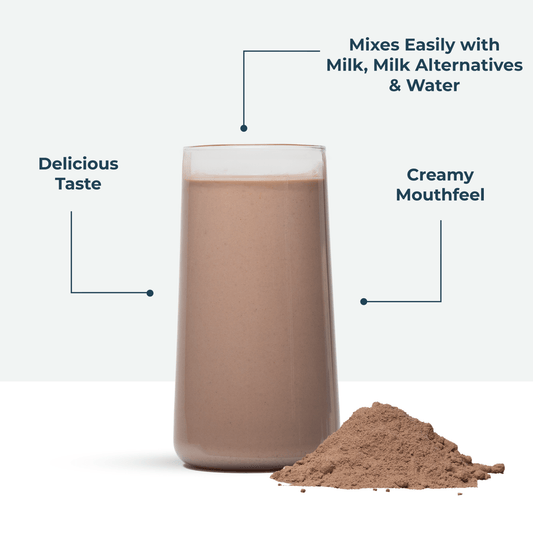When is the Best Time to Take a Protein Shake?

Content you'll find:
Whey Protein: Why Should You be Taking it?
When is the Best Time to Take Whey?
How to Take a Protein Shake?
Best Options, Whey Protein Powder or Ready to Drink Milkshake?
Overview whey protein, why you should be taking it?
Whey protein is one of the two proteins in milk (the other being casein) and a by product of cheese-making. You know that liquid that sits on the top of our yoghurt when we first open it? That is also whey protein. The whey protein we buy has been dried and processed to provide us with a low-calorie, high protein food supplement that we can easily add to our diet. You can read more about what is whey and why we need it.
Muscle mass is the currency of our health and building and maintaining it is one of the most valuable investments we can make into the quality of our life in years to come. The key dietary consideration when it comes to building and maintaining muscle mass is our protein intake. Read our blog outlining what are the best supplements to take when building muscle. When it comes to protein in the diet, there are three things to consider - total amount of protein you consume each day, the timing of this protein intake and the type of protein you consume. Whey protein can tick the box on all three of these! It is an excellent type of protein powder to choose because it is high quality, easily digested & absorbed by the body (with the exception of those who are lactose intolerant or sensitive to whey protein).
It contains all 20 amino acids, making it a complete protein source. Most importantly, it contains the 9 essential amino acids often referred to as the building blocks of protein within the body(6). These are essential because the body cannot make them and so we must consume them through our diet(2). Protein is also what makes up our muscle tissue. When we consume a complete source of protein, we take in the essential amino acids which provide energy to our cells for immune function, hormone production, muscle growth and maintenance. The recommended daily intake for protein is 1.6-2g per kilogram body weight per day, with athletes consuming the higher end of this range(2).

When is the Best time to take whey?
Although there is no one best time to consume any protein, there are more optimal times to include it in our diet. It is important that we time our meals well so that our total protein intake is distributed at regular intervals throughout the day, rather than just in one or two meals. Consuming 20-40g protein at each meal is a good guideline to follow in order to achieve our daily needs.
Breakfast
Breakfast is a key time to consume a portion of the energy and essential nutrients our body needs to function and perform optimally. Carbohydrates are the body's primary source of energy so including them in greater quantities in breakfast can fuel us for the activity ahead. On the other hand, if we are less active, we may include more healthy fats such as nuts, seeds, avocado, eggs, etc., in our breakfast and reduce the carbohydrate content. However one thing that doesn’t change is our need for protein at breakfast time. Our body has been fasting all night, and recovering from the day before. This means our muscles have spent hours breaking down our proteins while rebuilding and repairing any damage to our muscles from the previous day. Consuming a source of protein at breakfast time will help to maintain muscle tissue and aid the adaptation process following exercise as well as helping us to feel fuller for longer into the afternoon.
Having whey protein in our breakfast or alongside our breakfast ie. in a shake (particularly if we know the meal is a poor source of protein), is a great way of increasing our total protein intake for that day while consuming it at a time that our body will really benefit from it.
Between meals
Protein is the most satiating macronutrient which can help to manage our cravings, snacking between meals and desire to eat more calorie dense foods, which can contribute to fat gain if consumed in excess. If you find you make poorer nutrition choices because of hunger or cravings, lack of preparation or something unexpected came up in your day, a protein rich snack might be a helpful option to have on standby.
Post-exercise
When we exercise, we break down our muscle fibres and cause damage to them. In order for our muscles to recover and adapt to this training session, we must provide them with the support to do so. Consuming a whey protein shake in the post exercise period (within approximately 90 minutes) will provide your body with the amino acids it needs to repair and build muscle tissue, before you sit down to your next whole meal(1,2,3,7). Whey protein is shown to be the most bioavailable protein supplement, making it a great choice during this critical post exercise window(4). Kinetica whey protein powders and protein shakes also contain a great source of leucine - which is key for muscle protein synthesis to occur(5,6).
Before bed
For individuals who have struggled to meet their protein requirements throughout the day and have engaged in a tough training session, particularly late that evening, consuming a scoop of whey protein before bed can not only contribute to total protein intake for that day, but is also shown to support muscle growth and repair overnight(8,9,10).

How to take a protein shake?
Simply adding a scoop of protein to some water, milk or a smoothie can be a really easy way of consuming whey and is a relatively low calorie, protein-rich option. When deciding what to put in your protein shake, first think about what you need from it and then add your other ingredients accordingly. For a higher carbohydrate content, before or after exercise, you could add oats, banana or some honey. For a lower carbohydrate shake, with higher unsaturated fat (good fats), peanut butter, avocado or greek yoghurt work well. Kinetica’s Ready to Drink (RTD) protein shakes come in a 330ml bottle and are a convenient way of getting protein on board too, and are easy to pack with you on the go.
Best options Whey Protein & Ready to Drink Milkshakes?
Although whey protein should not be used in place of whole food sources of protein (ie.chicken, meat, fish, nuts, seeds, milk, yoghurt), there is no doubt that it can be a really useful addition to our diet. It can help us to reach our protein targets, maintain our lean mass but also keep us feeling satisfied before our next opportunity to sit down and eat a whole meal. Kinetica's Protein Powders and Ready to Drink High Protein Milkshakes are a great choice not only because they are naturally sourced and derived from grass-fed, hormone free cows milk but they are also batch tested to comply with WADA standards. Kinetica goes that extra step to work with nutritionists, external advisors and customers to make sure that they are constantly delivering the highest quality products.
About the Author
Heather is a nutritionist with daveynutrition, an online nutrition company founded by Daniel Davey. She has a Degree (Hons) in Public Health Nutrition and is currently studying a Diploma in Performance Nutrition.
Within daveynutrition, Heather is involved in the creation and management of website content, nutrition and lifestyle articles, nutrition programs, meal plans and the recipe page. Recently, Heather was involved in development and analysis of recipes for Daniel Davey’s new book - Eat Up - The Next Level. Heather is currently the Performance Nutritionist with the Westmeath U20 hurlers and has experience in 1-1 nutrition coaching, workshops and aspires to continue to work with athletes and other high performing individuals.
Heather has a keen interest in health, nutrition and performance and enjoys being active and outdoors, spending her free time in the gym, running or swimming.









